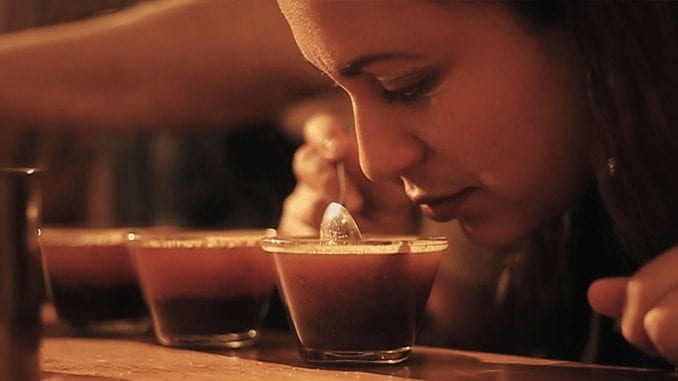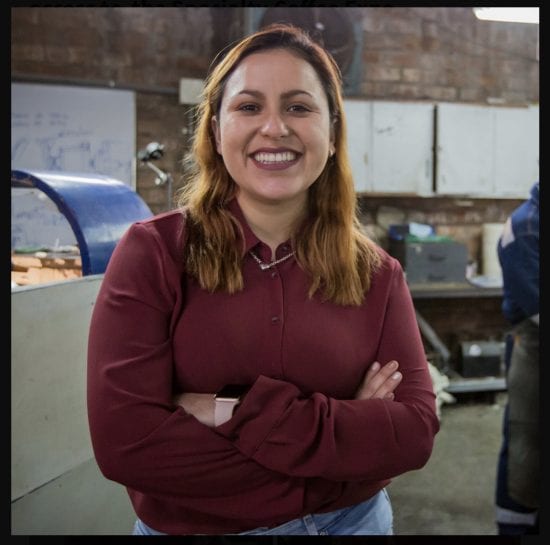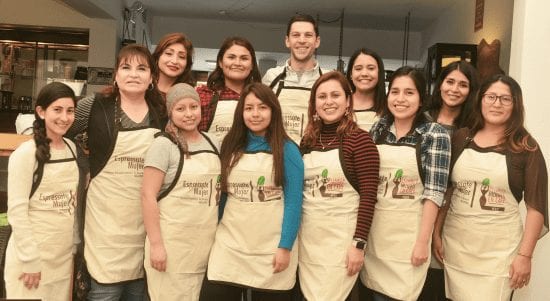
We chat with 2020 Re:co Fellow and founder of the Peru chapter of the IWCA about her time developing the specialty-coffee community in the country.
BY VALORIE CLARK
SPECIAL TO BARISTA MAGAZINE ONLINE
Feature photo courtesy of Anggela Sara Garcia
In Lima, Peru, Anggela Sara Garcia has leveraged her passion for coffee into founding several community-focused endeavors in the country, including the Specialty Coffee Community, the Espressate Mujer barista championship, and the Peru chapter of the International Women’s Coffee Alliance. She has also taken over coffee equipment manufacturing company IMSA—the first woman in three generations to do so. We sat down to talk with Anggela about how she got started in coffee, where she sees the future of coffee in Peru going, and what makes her so passionate.
This interview has been translated from Spanish. It was edited and condensed for clarity.

Valorie Clark: What are your first memories of coffee?
Anggela Sara Garcia: Uff, thousands! The prettiest ones are of whole weekends running around the farm with my brother and my cousins helping our grandparents: at harvest time counting the cans of coffee they brought for processing, my dad designing and building machines, my mom preparing coffee. Memories that tell you, hey! Life is good.
How did you start working in specialty coffee?
I studied dentistry, because it was the career that I liked, but my father passed away in 2008 and things changed. My uncle took over the management of the company and I had to support certain tasks while I was doing my paperwork to go do a specialty in Brazil for my career. As part of my support activities at IMSA, I went to a cupping class, which in those years were scarce. I came from a coffee family: growing on the farm, knowing about processes and machines, but I had never done a coffee tasting. So I took the cupping class and fell in love. I left everything. The following week I was enrolling at ESAN (a university specializing in business) to study managing coffee and cocoa cooperatives.
My first job in coffee was administrative support in a company that manufactures machines to process coffee and cocoa. That gave me the opportunity to get to know a world unknown until then to me.
What problems does the coffee community in Peru face?
We have several, many of them shared with many producing countries: low prices, plagues, climate change, corruption of the unions, now a pandemic, etc. But for me the main problem (added to the above) is how little coffee we consume nationwide. The most alarming thing is that most of it is poor quality. Being a producing country of the best coffees in the world, how is it possible that consumption is less than 1kg per capita per year?
Another major problem is that the average Peruvian does not know specialty coffee, therefore he does not know how to pay for it. When he sees the prices he is scared and says: Why so expensive? In Peru a bag of specialty coffee is around $8.50 USD.
Since I organized Espressate Mujer and began to delve into everything about the championships, I realized that as a country we do not invest in these. We only carry out (officially) the barista championship, leaving out all other events, which in a country like ours would help a lot to develop an improvement in the coffee culture. It would challenge baristas to professionalize the sector and enhance their knowledge, thus drawing more attention from the consuming public, where we would be motivating the entire chain.

We will continue this interview next week.

ABOUT THE AUTHOR
Valorie Clark (@TheValorieClark) is a freelance writer with a background in specialty coffee. She is based in Los Angeles.

